How long does THCA stay in your system? It varies widely based on metabolism, body fat, and usage frequency—from a few days to several weeks. In this article, we’ll break down the key factors and testing methods that influence THCA detection times.
Key Takeaways
- THCA is a non-psychoactive cannabinoid with potential therapeutic benefits that transforms into THC when heated.
- The retention time of THCA in the body is influenced by factors such as metabolism, frequency of use, and consumption method.
- Different drug testing methods have varying detection windows, with hair tests providing the longest detection period for cannabis substances.
What is THCA?
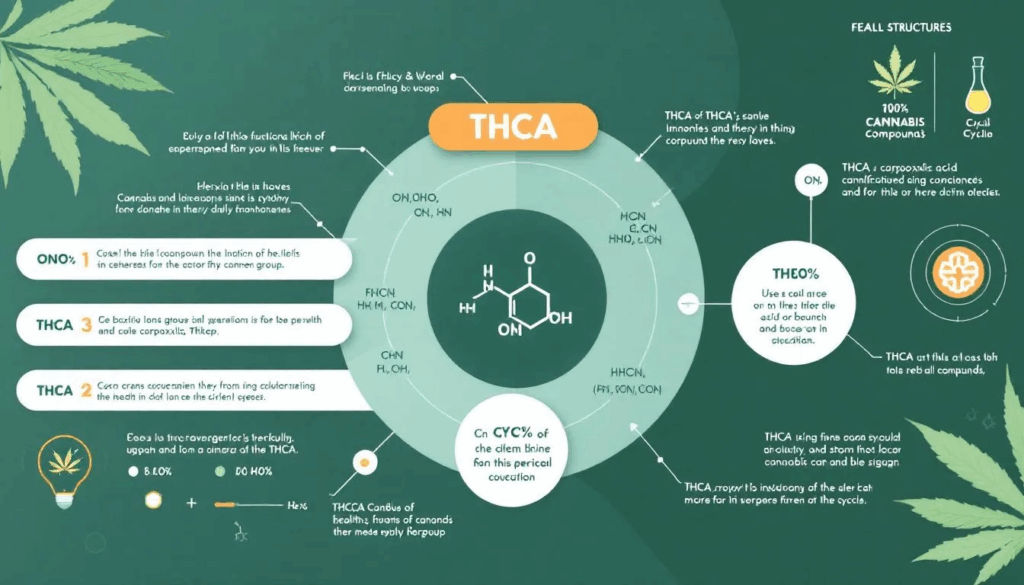
THCA, or tetrahydrocannabinolic acid, is one of the many cannabinoids found in raw cannabis plants. Unlike THC, its psychoactive counterpart, THCA does not induce intoxication unless it is heated. This transformation occurs through a process called decarboxylation, which converts THCA into psychoactive THC, the compound responsible for the psychoactive effects of cannabis. Additionally, THCA converts into THC when exposed to heat.
THCA is garnering interest for its potential therapeutic benefits, including:
- Anti-inflammatory properties
- Neuroprotective properties, beneficial for conditions like arthritis
- Alleviation of nausea and vomiting, particularly in patients undergoing chemotherapy
This non-psychoactive cannabinoid offers a range of potential health benefits without the high associated with THC, making it a compelling option for those seeking therapeutic effects from cannabis compounds.
Knowing what THCA is and its mechanism helps in grasping its retention time in your system, which depends on various factors including your metabolism and lifestyle.
How the Body Processes THCA
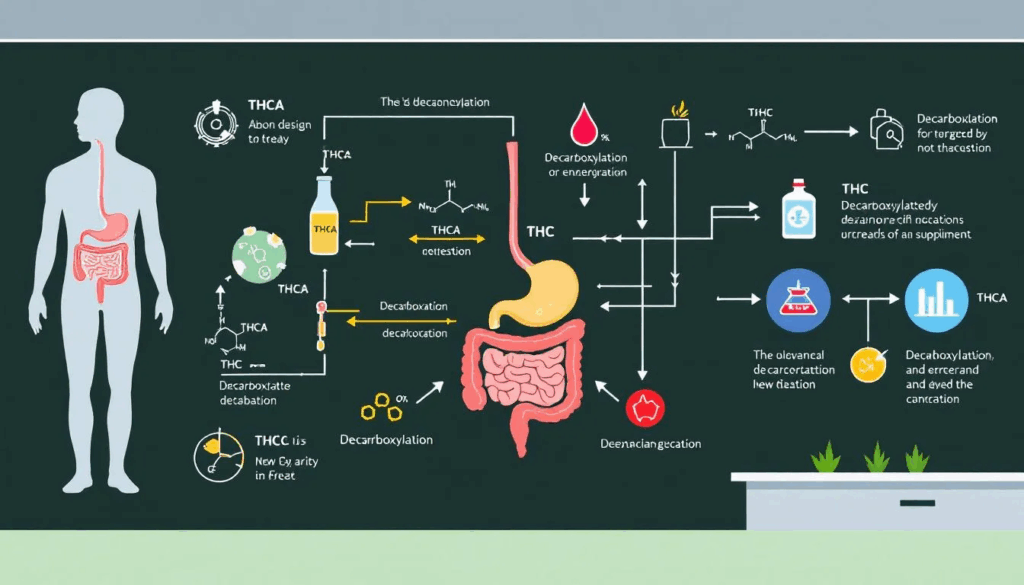
When you consume THCA, the method of intake significantly influences how it is processed by your body. For instance, inhaling THCA allows it to enter the bloodstream quickly, providing almost immediate effects. Sublingual consumption, where THCA is placed under the tongue, also results in rapid absorption as it bypasses the digestive system and enters the bloodstream directly, consuming THCA.
Oral consumption, such as eating edibles, involves a more complex journey:
- THCA is first digested in the stomach and intestines.
- It is then absorbed by the liver where it is metabolized into various metabolites, including THC.
- This process is slower but results in a longer duration of effects.
- Once in the bloodstream, THCA and its metabolites are distributed throughout the body, preferring to store in fatty tissues.
The body eventually excretes THCA primarily through feces, with some elimination via urine. The liver plays a crucial role in this process, breaking down THCA and facilitating its removal from the body. Recognizing how your body processes THCA helps explain its varying detection periods, influenced by multiple factors.
Factors Affecting THCA Retention
There are multiple factors that affect the duration of THCA in your system. These elements play a significant role in determining how long it remains detectable. One primary factor is your metabolic rate. Faster metabolism can clear substances like THCA more quickly, while a slower metabolism can result in longer retention times. Body composition also plays a crucial role; individuals with lower body fat levels tend to eliminate THC metabolites more rapidly.
Frequent and heavy users accumulate more cannabinoids in their system, leading to longer retention periods compared to occasional users. Regular users may find that THC binds to how long does thca stay in their system for weeks or even months, whereas one-time users may clear it within a few days, raising questions about how long does thca cannabis compounds stay detectable and how long cannabis compounds stay.
Hydration levels, diet, and exercise also significantly impact how long THCA and its metabolites stay detectable in the body. These factors can provide insight into how long THCA stays in your system and ways to potentially speed up its elimination.
Detection Times for Different Drug Testing Methods
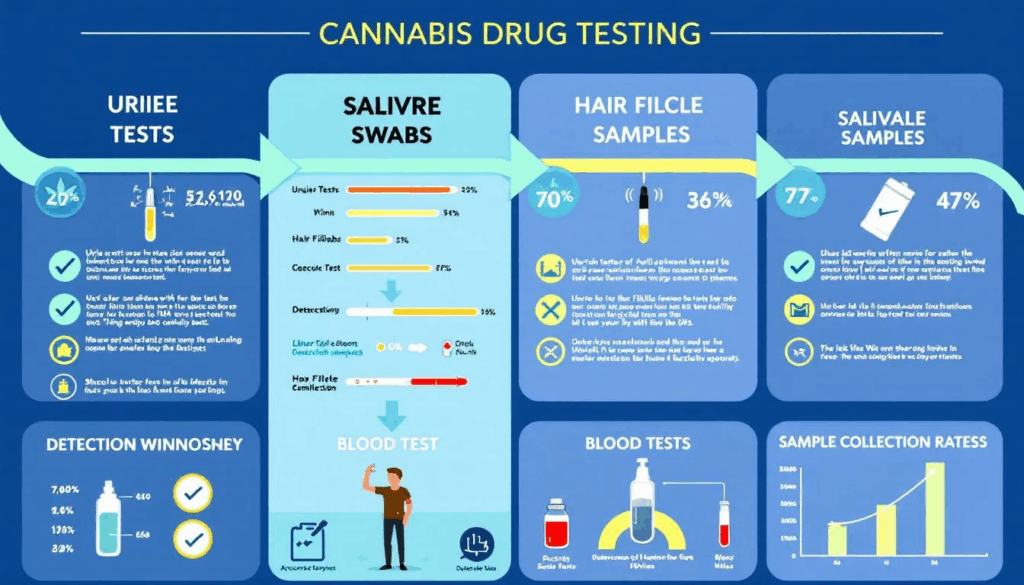
Different drug testing methods have varying detection windows for THCA and cannabis metabolites. While THCA itself is not typically the target of drug tests, it can convert into THC, leading to detectable THC metabolites. The type of drug test used significantly influences how long these metabolites remain detectable, with some tests offering longer detection windows than others. Additionally, detecting thca detectable forms can play a role in the overall detection of THC.
Let’s explore the specifics of each testing method to understand their unique detection timelines.
Urine Tests
Urine tests are the most common method for detecting THC metabolites, including THC-COOH. These tests can detect THC metabolites for varying periods depending on the frequency of use:
- For one-time users, THC metabolites typically remain detectable for about 3 to 5 days.
- For chronic users, these metabolites can be detectable for up to 30 days or more.
- Some heavy users may test positive for up to 45 days.
Several factors influence the detection window in urine tests, including individual metabolism, hydration levels, and the method of consumption. For example, urine drug screening shows that edibles tend to have longer detection times compared to other consumption methods.
Common methods of urine testing include standard drug tests, standard immunoassays, and more precise GC-MS tests. Being aware of these common drug testing methods can help you prepare for urine tests and estimate THCA detection times.
Blood Tests
Blood tests are primarily used to detect cannabis use, offering a short detection window of about 24 to 48 hours for occasional users. These tests are often employed in law enforcement settings to identify recent consumption. Blood tests detect THC and its metabolites, providing a snapshot of recent use rather than long-term habits.
Given their short detection window of only a few hours, blood tests are less useful for identifying prolonged cannabis use but are effective in situations requiring evidence of recent consumption.
Saliva Tests
Saliva tests are another common testing method due to their non-invasive nature and quick results. Key points about saliva tests include:
- They can detect THCA presence mainly within the first 24 to 72 hours post-consumption.
- Frequent users may still test positive for several days.
- Occasional users typically have a shorter detection window.
Saliva tests are popular among employers and law enforcement because:
- They are quick and non-invasive.
- They use a sponge or absorbent pad to collect a sample.
- They have a similar sensitivity to blood tests when it comes to detecting recent cannabis use.
Hair Tests
Hair tests provide the longest detection window for THCA, identifying usage for up to 90 days. These tests can detect THC usage over extended periods, making them a reliable method for tracking long-term consumption.
Hair tests are particularly useful for employers and other entities interested in long-term drug habits rather than recent use. Their ability to detect usage over months makes them a comprehensive tool for understanding an individual’s cannabis consumption patterns, including insights from hair follicle tests.
The Role of Consumption Methods
The method of consumption significantly affects the absorption, metabolism, and retention of THCA in the body. For instance, sublingual administration offers higher bioavailability and faster absorption compared to oral consumption, which has a delayed onset due to digestive processes.
Inhalation provides almost immediate effects, with THCA reaching peak levels in the bloodstream within minutes. Meanwhile, consuming raw cannabis products or edibles results in a slower release of THCA into the system. These differences can guide you in selecting the most suitable raw cannabis consumption method based on your needs and desired THCA retention time.
Can You Quickly Detox THC Metabolites?
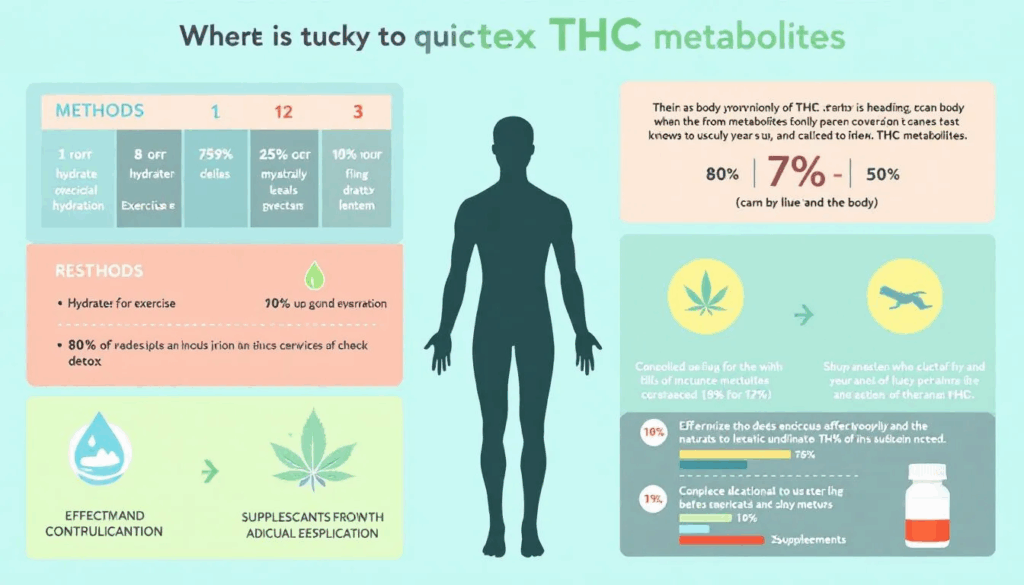
Many popular detox methods, such as detox kits and herbal supplements, lack scientific support and are often ineffective. Claims surrounding these products often serve to profit sellers rather than aid users.
The most reliable method for eliminating THC metabolites from the body is through abstinence and allowing time for the body to naturally detoxify. Staying hydrated and maintaining an active lifestyle can support the body’s natural detoxification processes, but no supplement can rapidly flush cannabis toxins.
Be wary of quick-fix claims and rely on the body’s natural processes for the most effective elimination of THC metabolites.
Impact of Lifestyle Choices on THCA Elimination
Lifestyle choices significantly impact the elimination of THCA from the body:
- A nutrient-rich diet supporting liver health can enhance the breakdown of THCA.
- Foods high in fiber can speed up elimination.
- Fatty foods may prolong retention.
Regular physical activity, including cardio and strength training, boosts metabolism and helps reduce THCA levels in the body. Staying properly hydrated also aids in the efficient elimination of THCA metabolites through urine. A balanced approach with proper hydration, a healthy diet, and regular exercise is key to how the body metabolizes THCA detoxification.
Gender and Genetic Differences in THCA Metabolism
Genetic factors and gender differences play a significant role in how THCA is metabolized, with key factors such as variations in an individual’s metabolism and enzyme efficiency affecting THCA breakdown. For example, females with certain genetic variants linked to slower THC metabolism are at an increased risk of developing cannabis use disorder.
Men with slower THC metabolism often report more negative subjective psychoactive effect than their female counterparts. These genetic and gender differences can aid in managing cannabis use and predicting THCA retention duration.
Prescription Medications and THCA Interaction
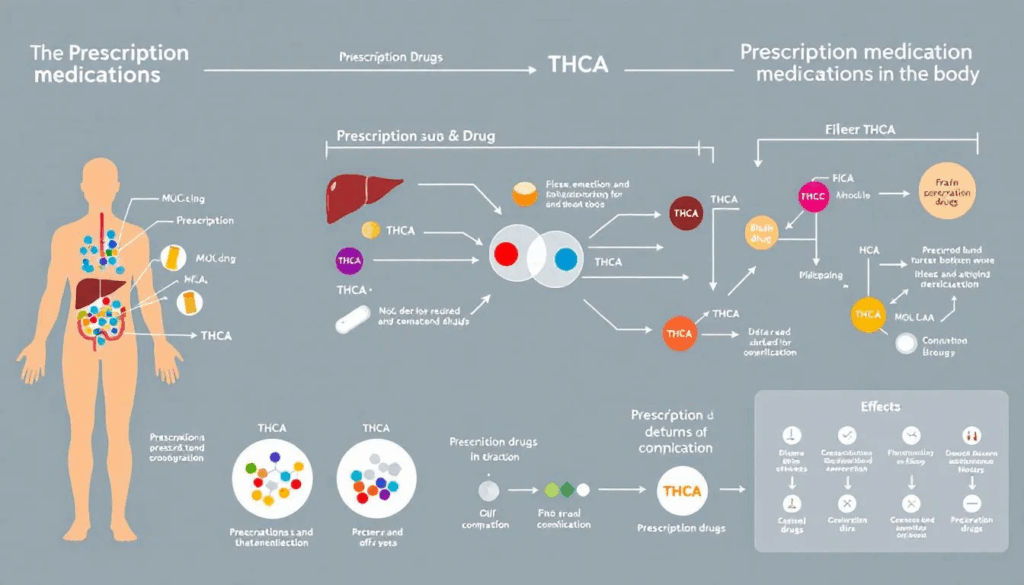
Certain prescription medications can interfere with how THCA is metabolized, potentially leading to longer detection periods. Medications that inhibit cytochrome P450 enzymes can increase the concentration of THC and its metabolites in the body, affecting detection times.
Monitoring drug metabolites levels is crucial when cannabis research and cannabinoid metabolites are introduced to a treatment regimen involving medications metabolized by similar pathways. Being aware of these interactions can help in managing side effects and ensuring treatment efficacy.
Stress and Hormones: Influence on THCA Retention
Stress and hormonal fluctuations can significantly impact THCA retention in the body. Increased stress levels can enhance the release of THCA into the bloodstream due to lipolysis, while stress-related hormones can delay the breakdown and clearance of THCA.
Food deprivation has also been shown to increase blood levels of THCA by promoting lipolysis. Managing stress and hormonal changes with these insights can optimize THCA elimination.
Comparing One-Time vs. Regular Use
The elimination and retention of THCA and its metabolites vary between one-time and chronic users:
- One-time users typically eliminate THCA and its metabolites within a few days.
- Chronic users may retain these compounds for weeks or even months.
- The plasma half-life of THC varies between occasional and chronic users, with chronic users experiencing extended retention times.
Hair tests pose a particular challenge for chronic users, as they can yield positive drug test results long after stopping use. These differences can guide cannabis consumed management according to individual usage patterns, including the implications of a positive drug test.
Myths About Cleansing Teas and Supplements
Despite popular belief, no scientific evidence supports the effectiveness of cleansing teas or herbal supplements in eliminating THC metabolites from the body. Many commonly believed detox methods, such as cranberry juice and vinegar, do not actually clear THC from the body.
The most reliable method for clearing THCA from the body is through the body’s natural processes and time. Be cautious of quick-fix detox claims and trust that the body’s mechanisms are the most effective for clearing THC.
Legal and Employment Considerations
THCA is often legal in places where THC is not due to its non-psychoactive nature. However, consumers should check local laws before using THCA products, as some states have restrictions.
Employers typically conduct drug tests with no regard for the legality of THCA products in their state. Even if THCA is legal, drug tests may still detect THC metabolites, leading to potential employment issues.
Summary
Understanding how long THCA stays in your system involves multiple factors, from individual metabolism to lifestyle choices and consumption methods. While quick detox methods are often ineffective, adopting a balanced approach with proper hydration, diet, and exercise can support natural detoxification processes. By being informed, you can better manage your cannabis consumption and navigate the complexities of drug testing and legal considerations.
Frequently Asked Questions
How to pass a drug test for THCa?
To pass a drug test for THCa, increase your fluid intake to dilute the concentration of drugs in your urine sample. This approach involves drinking plenty of fluids shortly before the test to help decrease the likelihood of detection.
How long does THCA stay in your system?
THCA can remain in your system for a few days after one-time use, while chronic use may lead to detection for weeks or even months, influenced by factors like metabolism and body composition. It’s important to consider these variables if you anticipate being tested.
Can THCA cause a positive drug test result?
Yes, THCA can lead to a positive drug test result if ingested in significant quantities, as it can be converted to THC in the body, which standard drug tests are designed to detect.
Are there any quick detox methods to eliminate THCA from the body?
The most effective way to eliminate THCA from your body is through abstinence and allowing time for natural detoxification. Staying hydrated and maintaining an active lifestyle may aid this process.
How do different drug testing methods vary in detecting THCA?
Different drug testing methods vary significantly in their detection windows for THCA. Urine tests can identify THC metabolites for up to 30 days, while blood tests are effective for 24 to 48 hours, saliva tests for up to 72 hours, and hair tests can detect usage for up to 90 days.
Author
-
As the Medical Director at New England Psychiatric Consultants, I’m dedicated to elevating mental health care through compassionate, evidence-based practices. With a robust clinical background and leadership experience, I work closely with multidisciplinary teams to design and deliver comprehensive outpatient and consultative psychiatric services. I’m passionate about championing innovative treatment approaches and optimizing patient journeys from assessment through recovery.
Key Expertise & Achievements
-
Leadership in clinical operations, quality assurance, and regulatory compliance
-
Implementation of integrated care models that enhance patient access and outcomes
-
Expertise across mood disorders, anxiety, and serious mental illness
-
Advanced training in psychopharmacology, psychotherapy, and collaborative care strategies
Professional Approach
Driven by empathy, teamwork, and data-informed decisions, I strive to foster environments where clinicians and patients alike feel supported. Whether guiding team development, streamlining care pathways, or navigating complex cases, I take a thoughtful, solution-oriented stance. -

